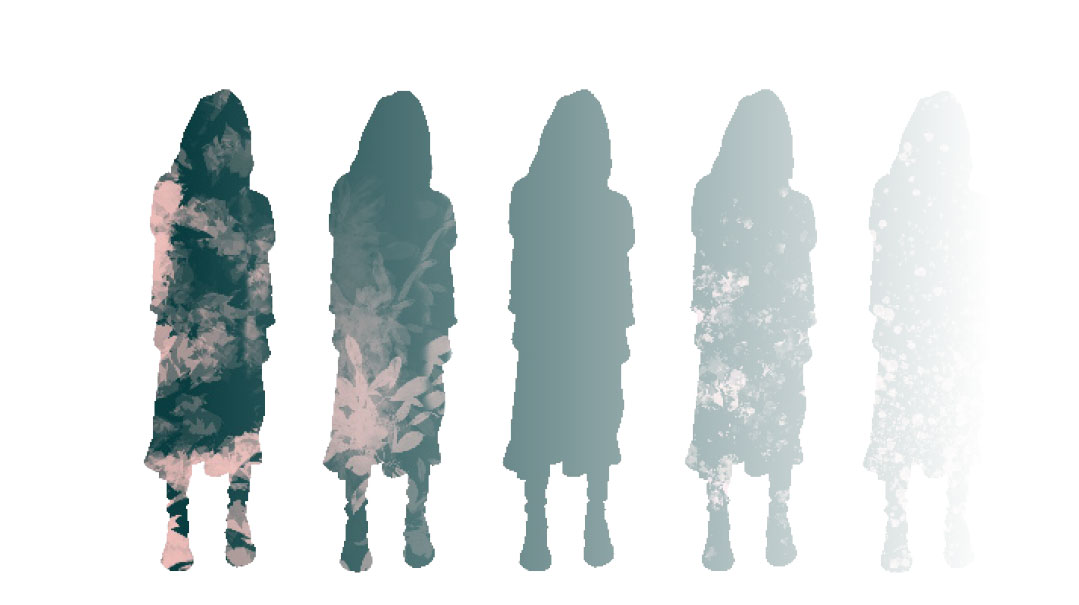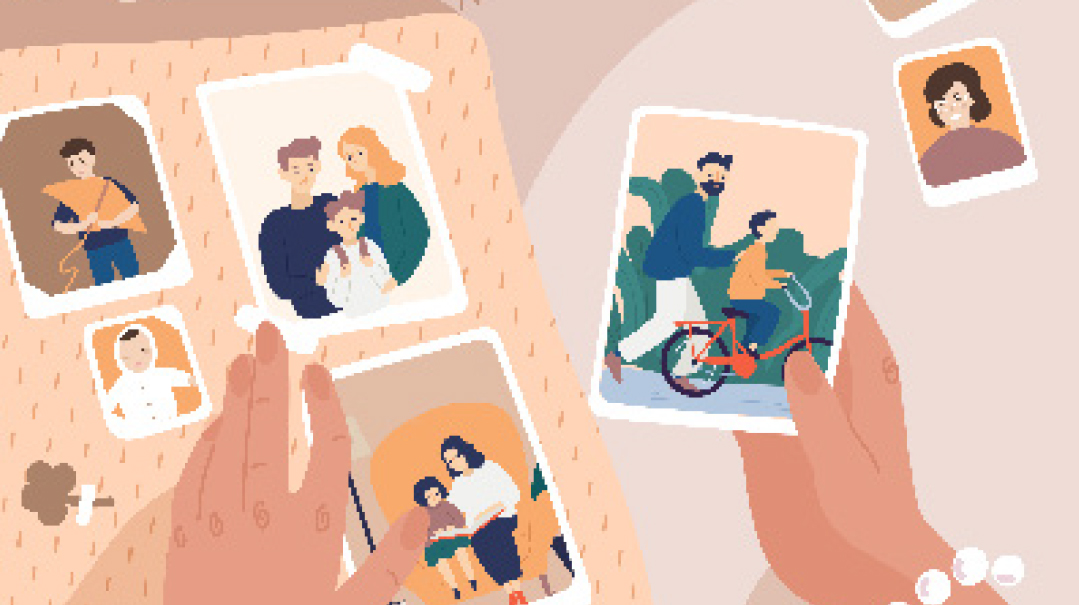Queen of a Stick

I would never be able to fashion my husband into the man I had hoped to marry, a man focused on serving Hashem and being a family man. But I could be his friend. And maybe, he would be mine

As told to Leah Gebber
L
ast month my ninth and youngest child got married. We accompanied her to the chuppah where her chassan — a fine man a mensch — waited and something inside me burst open.
I’ve never told my story but I felt that the time had come.
There’s a reason I never shared before: it was too hard. I had to keep my story shut inside me tight. Controlled. If I took it out and examined it if I grieved and was aggrieved then I was afraid I’d be unable to continue.
But now it’s time. And it’s a sweet triumph for me that all my children are married that they are all building Torah homes of their own. It’s a vindication of the years when I kept my feelings locked inside when I was mevater and strong. The years when I was queen of a stick.
Our fifth child was born when I was 24; I’d been 18 and my husband 19 when we married and we had to grow up pretty fast.
It was a complicated birth during which my son was deprived of oxygen. He was handicapped physically and mentally. I agree that this was a turning point but I get uptight about it as well. Lest someone blame my Pinny when it wasn’t him at all. No one else causes another’s inner demons I’ve learned.
Overwhelmed with caring for my brood and emotionally off-kilter from my son’s condition I barely noticed that my husband wasn’t coming home in the evenings.
Ah so it’s the wife you think while clucking your tongue. It’s the wife’s fault for not providing a warm sheltering cocoon. After all didn’t she promise when she circuited him seven times under the chuppah that she’d be a wall for him? A protecting wall that would be a barrier to the outside world?
I’ve been through these thoughts this guilt.
And I’ve come to realize that it was his choice. His choice to ask for what he needed — or choose to assuage his pain in the glitter the outside world offers.
As I said I didn’t even notice. I did notice that wads of cash were floating around: falling out of the pockets of his pants which I checked before sending to the dry cleaner. I’d see bills peeping out the pocket of his shirt. I wondered about it but the thought didn’t become a question because there was always something more pressing to ask.
I got used to going to sleep without him home. I was nursing a newborn; no surprise that I crashed at the end of each day. Until one night I woke up at 3 a.m. and he wasn’t home. I called the police. They laughed at me and told me that if he hadn’t turned up in 24 hours I should call again.
I didn’t have to. Half an hour later I heard his key in the front door.
He stumbled up the stairs wearing clothing I didn’t recognize: a gray T-shirt and tight black chinos.
“Where have you been?” I demanded.
“None of your business ” he said roughly.
I was afraid but I stood my ground. I picked up the phone. “Unless you tell me where you were I’m calling the police right now.”
He jeered but I glared at him. “They already know you’re missing.”
That seemed to knock some sense into him. “I was at a casino.”
Laugh at me if you will but I didn’t know what a casino was. He must have read the blankness in my eyes because he continued “A place where people gamble.”
“And drink ” I muttered.
So that was where the cash was coming from. Beginner’s luck. “How did you end up at a casino?” I asked.
“None of your business.”
Oh but it was.
And then just to infuriate me further he reached into his pocket and took out a packet of cigarettes. He lit one. My husband the nonsmoker. With our baby in the room passively breathing in all that poison.
I lost it. I grabbed the cigarette from him and threw it out of the bedroom window.
By this time the children had woken up from the yelling. There were a series of little knocks on our bedroom door. One by one I answered took each child firmly by the hand and led them back to their bedrooms. I took the baby with me set up a Pack ’n Play in the kids’ room and then squeezed into bed with my four-year-old. No matter that she poked and prodded me: I could not have slept if I wanted to.
By the time the sun rose I decided I must have dreamed the events of the previous night. Either that or I must have been absorbed in some gritty novel and had dreamed that I’d fallen into its pages.
Denial was on the breakfast menu along with fresh orange juice and cinnamon oatmeal.
But there was only so long I could close my eyes.
Soon enough, my husband — never one to say no to seconds of potato kugel — began hitting the gym. He lost a lot of weight, changed his eyeglasses, then his shoes. Then it was a nose job. He didn’t change his levush — call me a hypocrite, but I made it very clear that I wouldn’t have been able to tolerate that. (Besides, he wouldn’t have wanted to lose clients.)
He was seeking a certain image, a way of life that was cool, smooth, filled with vacations and even extreme sports. He spent a huge amount of money on diving equipment, and got an inflatable-wing thing to strap to his back and jump off mountains (which made me afraid I’d be not a divorcee, but an agunah). I didn’t ask too many questions, after I’d insisted on a psychiatric evaluation and was told that he was of sound mind.
His dream, he told me, was to buy a convertible and take down the roof and drive with the wind streaming into his face.
A convertible. Was he a baby? So shallow? So gashmiyusdig?
I kept telling myself to put it in context. All this was harmless. Maybe some would call it fun. He wasn’t being oiver a single aveirah.
Until he was. Desperate, I went to the rav. He was already aware of my husband’s changing image, and, without my knowledge, had tried a number of times to talk to my husband about it. My husband had shrugged off the rav’s advances, saying that he would never understand.
I didn’t think any of us would ever understand, but in the meantime I had to set some limits. We went out to eat — an upscale Asian place — and I tried to let go of some of my uptightness as I scanned the menu. Was it that? That by nature I was uptight, stick-to-the-rules? Boring? Had I pushed him off the edge?
If it was, I could try and loosen up a bit. I poked some fun at the menu, trying to pronounce the dishes’ names. I asked about the diving expedition he had planned. He brightened as we talked, and that made my soup even more difficult to swallow.
Eventually, I just blurted it out. Ten Commandments, I said to him, echoing the rav. That’s my condition for staying in this marriage. You keep the Ten Commandments.
He became absolutely still and just looked at me for a long time. Then he cradled his head in his hands. “You… you don’t understand.”
“So explain.”
“It’s… I…” He swallowed. “You know, I’ve never had a choice in my life. Since I was born, I was always the good boy, following what Tatty and Mommy told me. Work harder, learn better. Okay, you tell me to do it, I’ll do it. Go to this yeshivah, even if your friends are going someplace else. Okay, I’m a good boy, I listen to my parents. Marry this girl…”
He looked up at me; I couldn’t help the way my face crumpled.
“Okay. I listened.”
I waited for him to say that I was his bashert, that we’d been happy together. But he didn’t.
“They say, go into property management, you’ll provide for your family, it’ll be good for you. So I listened.”
I nodded, even as my tears fell. I watched them drop onto the table, then pressed my fingertip onto the droplets, as if I could wipe away the pain.
“And now I’m 27 years old, and I think… I’ve never once in my life done something that I wanted. I don’t even know what I want. Or who I am. So I’m trying to figure that out.”
“I… understand.”
He thought for a moment, then gave a curt nod of his head.
I took it that he agreed to my conditions.
But I still didn’t know how to deal with my shattered visions of our home and family.
I spent a lot of time by myself, even driving alone one day to the seashore. But although the constant battering waves soothed me, they didn’t give me a way forward. Nowadays, I would have sent myself to a good therapist, but I was young and inexperienced, and therapy wasn’t the big thing it is today.
I found my answer, though, in a way I can only describe as Hashgachah pratis. A while before, a baalas teshuvah had stayed in our home for a couple of weeks in the summer. When I cleaned out her bedroom, I noticed that she’d left behind a cassette recording of a shiur from Rabbi Akiva Tatz.
I put it into the tape deck and pressed play. It was up to the middle of the shiur, and I gathered that he was talking about Shlomo Hamelech and how he had been expelled from his kingdom when the head of the sheidim, Ashmedai, impersonated him and took his throne, leaving Shlomo with nothing but the staff in his hand.
“But even though he lost everything, he remained king over his stick,” Rabbi Tatz emphasized, in his clipped South African accent. He paused to let the message sink in. I pressed the off button. I had heard all I needed to.
King of his stick.
I looked around my home. My husband works in property management, and he earns a nice salary — honestly, more than we need with our little family. We own two cars, and our dining room is a cream-and-velvet dream. What was the point of it all? You make your home look malchusdig to reflect the honor of being Hashem’s servants. But for its own sake, it’s merely ostentation. Purposeless. But here it was, and it was mine.
I was queen of a stick. Actually, more than a stick. And if it didn’t reflect my husband’s avodas Hashem, it certainly could reflect my own — and that of my children.
With my husband’s salary, I could have bought jewelry and top-end clothing for me and the children. I could have redecorated the house and landscaped the garden. Of course, I spent money to make the house look beautiful, but I also paid for a lot of household help — as well as for help with our handicapped son. That way, I freed myself up to infuse ruchniyus into the children.
I baked challah with them. I took them to visit hospitals. Every time there was a siyum on Mishnayos or a Chumash party, I’d throw a second siyum at home, to show them what was choshuv to me. I took the children to Eretz Yisrael: they got brachos from gedolim and we davened at kevarim — as well as the requisite fun. I may have been queen of a stick, but I was queen, and I’d set a certain atmosphere in my home. I would show my children who and what we admired — and it wasn’t sports stars or politicians or people who had “made it big.”
I can’t explain how this became the focus of my days. Every single calendar event I planned carefully: How am I going to make this into the most beautiful experience for my children, how will I use it to build their middos? We put out a weekly news sheet for the extended family — with a middos corner and parshah tidbits — which taught my children the value of organization and teamwork and of catering to others’ strengths. We visited aquariums and flower shows and anything I could think of that would show them the beauty of Hashem’s world, and how much He loves us.
And I davened. “You’re also their Father,” I told HaKadosh Baruch Hu. “Please make sure they grow up as proud, ehrliche Yidden.”
Some told me I was trying too hard. I’ve been faulted before for being too serious. But everything we did was enjoyable — we had fun together. And my children seemed happy. They were bright and engaging, curious about the world and sensitive to others’ needs. Oh, they weren’t perfect; none of us is perfect. But I was proud of them.
It was when I’d worked a few years to establish that kind of atmosphere in our house that I could think about our marriage in greater depth. We had stayed together against the odds, seemingly with nothing in common beyond the children and a postal address. On some level, I knew that were I to respect my husband in a real, deep way, that would be meaningful. I’m talking more than the obvious “listen to Tatty” and serving him first. Something deeper.
Nervously, I asked to go along with him the next time he went diving. Not to dive, obviously, but I would sit in the boat. He was shocked at my request, but he agreed.
I made arrangements for the children and the next Sunday, I was up and dressed by 4 a.m., ready for the drive to the sea.
“You sure you want to do this?” my husband asked.
I nodded and gestured to a jumbo flask of coffee I’d prepared.
We were both quiet on the long drive. As soon as we arrived, my husband went off to change into his gear and meet “the guys.” I settled onto the boat that would take us out to the place where he’d dive. As he disappeared into the water, my husband lifted a single hand in a wave. The gesture warmed me.
They were exploring some underwater caves, so they were gone for a while. I turned my face to the autumn sun, wrapped my coat tightly around me, thought about how the water must be so much colder. I dozed and thought, and sat and relaxed. Just doing nothing, no one around, no persona to keep up. Just me and the sky and the waves. I was beginning to see what my husband meant — not just his love of these sports, but finding a place where you can be yourself, just yourself, without the world looking on.
I told him that on the way home. It may have been the best thing I ever said in all our marriage. His face lit up and he turned to me and asked if I was in a rush to get home or if we could stop at the service station. I was tired, a little achy, but I agreed. Without me there, I know that he would have eaten whatever he felt like (kashrus is not one of the Big Ten), but he was sensitive and ordered two black coffees. Then we sat down in a corner, at a Formica-covered table that rocked when I put my arms down to lean on it, and he started talking. He talked and talked. I was so tired I had to stop my eyes from closing, but at the same time one thought pierced through: He must be so lonely. All this time, he’s been lonely.
And you’ve been too.
I would never be able to fashion my husband into the man I had hoped to marry, a man focused on serving Hashem and being a family man. But I could be his friend. And maybe, he would be mine.
That was a watershed moment. It took years for me to be able to come to the point where I was able to accept him: First, I had to shore up the walls of my Yiddishe home. But I know that he stretched himself to live up to my standards. I could surely stretch myself to understand him, be there for him, and maybe even have a little fun together.
For his birthday that year, I rented him a convertible for the day. Good thing it falls out after Pesach, when the weather is already warm. It was parked outside the house at 9 a.m., and the keys delivered.
He was thrilled. “Come, come for a ride,” he begged.
I patted my freshly washed sheitel. “Me? Take the children!”
He shook his head. “No. I want to take you.”
What woman can resist that?
I climbed into the car, settled into the leather seat and put my head back. Seemed like I wasn’t just queen of a stick. For a day, I was queen of a convertible. And maybe something more, too.
(Originally featured in Family First Issue 544 – Shavuos 2017 Special Edition)
Oops! We could not locate your form.











